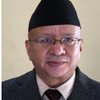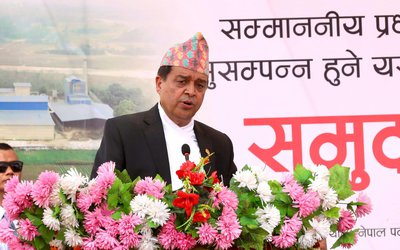Who says there has been no development or change in Nepal, on the contrary, it has reversed. Compared to the past six or seven decades, change is a natural process. In Nepal, the dress of the police service has changed from “khaki” to "navy blue" to traffic and spotted cloth , the roads have been widened by demolishing houses with dozers in Kathmandu, caste differences have ended, women's participation is increasing both in the house and in the workplace
Yes, caste differences have ended, women's participation is increasing both in the House and in the workplace. Load shedding in electricity has ended, water has reached Melamchi to wash the roads in Kathmandu, there have been 3 investment conferences, and the private sector has also held an infrastructure conference with the support of the government. , 36 finance ministers could present the budget only 78 times, remittances have increased, what is bad about going abroad, urbanization, this is a natural right, what happened when the village was empty, there was no cultivation, there is a house and a scattered place for development.
Isn't urbanization better than providing roads, communications, everything? Even the foreign development partner says to emphasize urbanization rather than village development for poverty alleviation.
Institutional memory has been arranged in the office, there is a government communication channel to speak the language of the government, people and common people.
Means of public communication for the citizens are being on , tower reconstruction after the earthquake, Dharahara or white tower has been built, as there is enough space for parking, a smart city is being built by placing pots and green and rubber flowers in the empty space, the tunnel has broken through, Pokhara and Lumbini .
Attempts have been made to run the airport. Yes, there are problems in cooperatives, the economy is not functioning, the capital market has not been able to accelerate, there is no point in writing about the words "political stability, coordination, implementation, capital expenditure, business loss, good governance" etc. Now, only one percent of these words need to be spoken and ninetynine percent of the work needs to be done …
We rarely work hard and we hardly work smart. The majority of Nepalis were hard workers by tradition and nature, toiling daily in the fields.
That somehow did not translate into "white-collar" work. It seems that we still haven't cultivated the necessary ethics and professionalism, which are required for today's office work and intellectual economy.
Look at the bureaucracy and judge for yourself. We want a quick and easy path to success. Prime Minister Dahal has claimed that the current government will last for five years. Some time ago, he alleged that some parties were trying to topple the government and break the alliance. He said that seeing that the government recently opened various corruption files for social justice, some parties are trying to topple the government.
Prime Minister Dahal also said that the government has succeeded in strengthening diplomatic relations with neighboring countries and other countries by keeping Nepal's national independence at the forefront. He said that many good works have been done in favor of social justice since the formation of the present government.
What is a successful and failed state?
The word that keeps coming up on social media is, failed state. If the mechanisms of state management fail to work, that country is called a failed state.
The relation of citizens is linked to the extent to which the state has been able to provide services such as human rights, minimum basic needs, education, health, drinking water, and employment to the people.
From this and other economic indicators, the success or failure of any country or government can be determined.
In Nepal, due to centralization of power in the government, it has not been resolved yet, there is a situation where some issues of good governance have not been resolved and there is not enough coordination between the federal and state governments, etc. can be a list of failures.
According to some people, Nepal is failing due to the debates between the sides and the opposition, which are the signs of the current instability. Basically and theoretically, if the economic and political situation of the country is extremely weak and out of control, then it is considered as a failed state .
Looking at the current economic situation and fundamentals of Nepal, such a situation is not seen at all .Why are you so tolerant of corruption, incompetence and misrule? There are many reasons for this.
People are too busy to think and care for themselves. Many people have lost interest in politics, and often think of all politicians as the same. They only focus on their own work and don't care much about people's feelings.
Most of them just want to go abroad. It is said that many people don't want to live in Nepal anymore, so they don't care much about the country. But life abroad is not easy either.
Their only focus is to leave the country and live somewhere else. No worries about the fear of political power. Even when someone raises his voice against corruption, he is afraid of being silenced due to political power and vandalism.
Therefore, it seems that it is better to be inactive than to act. There is a misconception that people themselves are so focused on their own needs and status that they will do anything to earn a large sum of money in a short period of time.
Key role of government
Government plays a key role in making any state successful or unsuccessful. It is the responsibility of the government to present the bill in the parliament and after it is passed, implement it and provide services to the people. The budget is also the same.
Developed countries seem to have borrowed up to 200 percent. They get more benefit from the loans taken in this way by investing in the productive sector.
If the loans taken by us can be used to invest in the productive sector, there is no need to be afraid of loans. The main thing is that it should be able to invest in the productive sector in an appropriate way.
If not, there is a possibility that the country will be ruined, but the current situation of Nepal is not like that Society is organized by three institutions of control.
Government manages the distribution and control of power (politics). Markets manage the distribution and control of wealth (economics). The community manages the distribution and control of status (membership).
As social beings, we use government to manage one of the three most important forces in society. It does not control the society alone. But without any form of government, people will take advantage of one of the other two institutions and create a government to regulate the flow of power.
A ruler can only see his ideas "working", not resistance to them, and is often likely to treat any apparent resistance as a new problem to be addressed through another law (threat of violence).
Sometimes governments really do learn, adjust and improve, but it is much easier to identify the failures of governments than to consider all the successes of some governments.
The sad thing is that this is always going to be exactly the case because government successes are easily forgotten while failures always last only until the next round of elections of a new group of people who promise to do better but rarely deliver.
Nepal opened up to the rest of the world only in 1951. Before that it was completely isolated, like a medieval "time capsule". Therefore, the Nepalese people went directly from feudalism to modernity without acquiring the necessary modern thinking and the ability to solve larger social problems.
Imagine Jung Bahadur caught up in modernity and the internet age. How would he have reacted? He may have adapted to new technology and learned to use the internet, drive, go to clubs, but at heart he will still be a primitive feudal type.
We are still dealing with modernity. But we have not acquired the mental processes necessary to build a modern society. We still don't understand meritocracy, egalitarianism, the rights and responsibilities of citizens, what is the greatest good, how society maximizes value for the maximum number of its citizens, or how countries solve major social problems, etc.
There are many factors that can ruin a country, some of which include: Political instability: Frequent changes in leadership or government can lead to uncertainty and instability, which can harm a country's economy and social structure.
Economic Mismanagement:
Poor economic policies, corruption and mismanagement of resources can lead to economic collapse and poverty. Social unrest:
Discontent among different groups of people can lead to social unrest, protests and even violence, which can destabilize a country.
Environmental Degradation: Neglecting the environment can lead to natural disasters, loss of biodiversity and health problems, which can affect a country's economy and well-being. External factors: A country's fortunes can also be affected by external factors such as war, trade restrictions, or global economic recession. These are just a few examples, and there are many other factors that can contribute to the downfall of a country.
What are the biggest problems of Nepal?
There are countless problems in Nepal now. Unemployment in some majors: Finding a well-paying job in Nepal has become a major challenge for many educated youth.
Even if you get a job, the salary is not enough to cover the monthly expenses. So many young people go abroad in search of better opportunities. The current government has not shown any signs of bringing policies to create more jobs in the country.
The recent budget has tried to make some efforts and successfully implement the policy of exporting information technology in a few years to five billion.
According to the recent law, it is illegal to post objectionable comments online about high-ranking officials of the country.
Perhaps the caricature of Liquan Yu in Singapore or imitating him is considered disrespectful to the public, while in Nepal, all the high-ranking officials go to the “Gaijaatra” and laugh at their own caricature. According to Transparency International, Nepal is among the most corrupt countries in the SAARC region.
Too much politics:
In Nepal, it is a common belief that it is difficult to work if you do not have political connections or a relationship with a prominent person. There is a common complaint that even to get a job outside of an organized organization, there is a need to have some relationship regardless of talent and skill.
As a result, most people are involved in some political organization. Shopkeepers, rickshaw pullers, teachers, students, lawyers, journalists, "blue-collar" workers, doctors, etc., all have their own political party, which has its own political party.
Therefore, to survive in Nepal, one has to be affiliated with at least one political organization which is a sad situation in itself.
Lack of foresight:
Is the government unable to bring the necessary vision to Nepal for economic growth, job creation, corruption reduction, infrastructure development, etc. or is the problem in the implementation itself?
Mahakabi Lakshmi Prasad Devkota has said, “Foreign is a dream; One is the story of Kata-Kata; It is a flicker of the unseen, a vague imperceptible external thing; What is the relationship of my eyes with those who do not fall within my horizon! How few Nepalis remember that there is a world outside the hemisphere of this Nepali constellation?
My country is my world; Marketing is; My truth is; The only pit is existence.' “When I am abroad, I am watching dramas and dramas; When I am in the country, I continue to experience life.”
- Nepal-India Trade, Transit And Unauthorized Trade: Some Considerations
- Jan 16, 2025
- PM Oli’s Forthcoming Visit To China: Will The Achievement Be Complete?
- Nov 29, 2024
- Obituary To Dr. Mohan Man Sainju!
- Nov 02, 2024
- Donations To Political Parties: Some Reflections
- Oct 24, 2024
- From the “Tito Satya” of the small screen to the“ChakkaPanja-5 of big screen – Is it "Must see" or Bhaigo" Pass" to watch?-
- Oct 15, 2024















